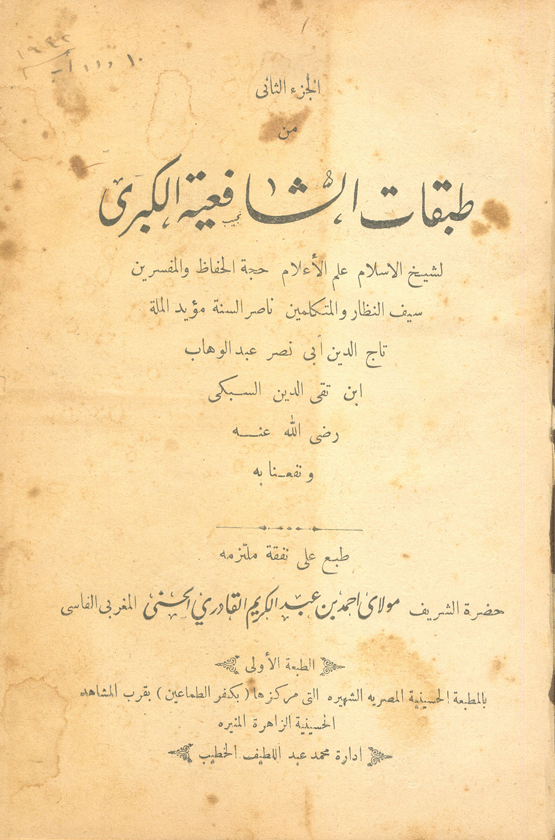Tabaqat on:
[Wikipedia]
[Google]
[Amazon]
 Tabaqat ( ''ṭabaqāt'') is a genre of Islamic biographical literature that is organized according to the century in which the notable individuals (such as scholars, poets, etc.) lived. Each century or generation is known as a ''ṭabaqah'', the plural of which is ''ṭabaqāt''. The ''ṭabaqāt'' writings depict the past of a particular tradition of religious affiliation or scholarship and follows a chronological parameter that stretch from an authoritative starting-point to the generation (''ṭabaqah'') immediately preceding the assumed author.
Tabaqat ( ''ṭabaqāt'') is a genre of Islamic biographical literature that is organized according to the century in which the notable individuals (such as scholars, poets, etc.) lived. Each century or generation is known as a ''ṭabaqah'', the plural of which is ''ṭabaqāt''. The ''ṭabaqāt'' writings depict the past of a particular tradition of religious affiliation or scholarship and follows a chronological parameter that stretch from an authoritative starting-point to the generation (''ṭabaqah'') immediately preceding the assumed author.
 Tabaqat ( ''ṭabaqāt'') is a genre of Islamic biographical literature that is organized according to the century in which the notable individuals (such as scholars, poets, etc.) lived. Each century or generation is known as a ''ṭabaqah'', the plural of which is ''ṭabaqāt''. The ''ṭabaqāt'' writings depict the past of a particular tradition of religious affiliation or scholarship and follows a chronological parameter that stretch from an authoritative starting-point to the generation (''ṭabaqah'') immediately preceding the assumed author.
Tabaqat ( ''ṭabaqāt'') is a genre of Islamic biographical literature that is organized according to the century in which the notable individuals (such as scholars, poets, etc.) lived. Each century or generation is known as a ''ṭabaqah'', the plural of which is ''ṭabaqāt''. The ''ṭabaqāt'' writings depict the past of a particular tradition of religious affiliation or scholarship and follows a chronological parameter that stretch from an authoritative starting-point to the generation (''ṭabaqah'') immediately preceding the assumed author.
Development
Tabaqat literature originated sometime within the late eighth and ninth centuries. Another account also cited that the Tabaqat format became popular during the period of early ''hadith
Hadith is the Arabic word for a 'report' or an 'account f an event and refers to the Islamic oral tradition of anecdotes containing the purported words, actions, and the silent approvals of the Islamic prophet Muhammad or his immediate circle ...
'' transmitter critics, emerging amid the effort to identify, classify, and evaluate transmitters in the discipline known as ''ilm al-rijāl''. The ''Tabaqat'' literature were written as tools to assist the muhaddiths in their efforts to classify ''hadith'' transmitters and to determine the quality of particular isnads. The isnad as a system for authenticating the memory of prophetic period required righteous, honest, and competent transmitters in every generation. Biographical entries in the ''Tabaqat'' literature typically offer evaluations of the personal, religious and intellectual quality of their subjects.
Examples
Famous examples of Tabaqat literature include ''Ṭabaqāt al-Ḥanābilah'' originally by Ibn Abi Ya'la and then byIbn Rajab
Abd al-Rahman ibn Ahmad ibn Rajab (736-795 AH / 1335–1393 CE), commonly known as Ibn Rajab, (which was a nickname he inherited from his grandfather who was born in the month of Rajab), was a muhaddith, scholar, and jurist. Notable for his comme ...
. '' Kitab Tabaqat al-Mutazilah'' (concerned with theologians of the Mutazilite school) by Ahmad bin Yahya al-Murtada, ''Kitāb al-Ṭabaqāt al-Kabīr'' (about the companions of the Prophet
The Companions of the Prophet () were the Muslim disciples and followers of the Islamic prophet Muhammad who saw or met him during his lifetime. The companions played a major role in Muslim battles, society, hadith narration, and governance ...
and their successors) by Ibn Sa'd
Abū ‘Abd Allāh Muḥammad ibn Sa‘d ibn Manī‘ al-Baṣrī al-Hāshimī or simply Ibn Sa'd () and nicknamed ''Scribe of Waqidi'' (''Katib al-Waqidi''), was a scholar and Arabian biographer. Ibn Sa'd was born in 784/785 CE (168 AH) and di ...
and - more recently - ''Tabaghat Aa'lam Al-Shia'' (about famous Shia
Shia Islam is the second-largest branch of Islam. It holds that Muhammad designated Ali ibn Abi Talib () as both his political successor (caliph) and as the spiritual leader of the Muslim community (imam). However, his right is understood ...
scholars] by Agha Bozorg Tehrani. The case of Ibrahim Hafsi's compendium of works, which are based on the ṭabaqāt historiographical
Historiography is the study of the methods used by historians in developing history as an academic discipline. By extension, the term ":wikt:historiography, historiography" is any body of historical work on a particular subject. The historiog ...
framework, also demonstrate how the genre is applied in various fields in the Arabo-Islamic civilization and religious disciplines.
See also
* Tabaqat-i NasiriReferences